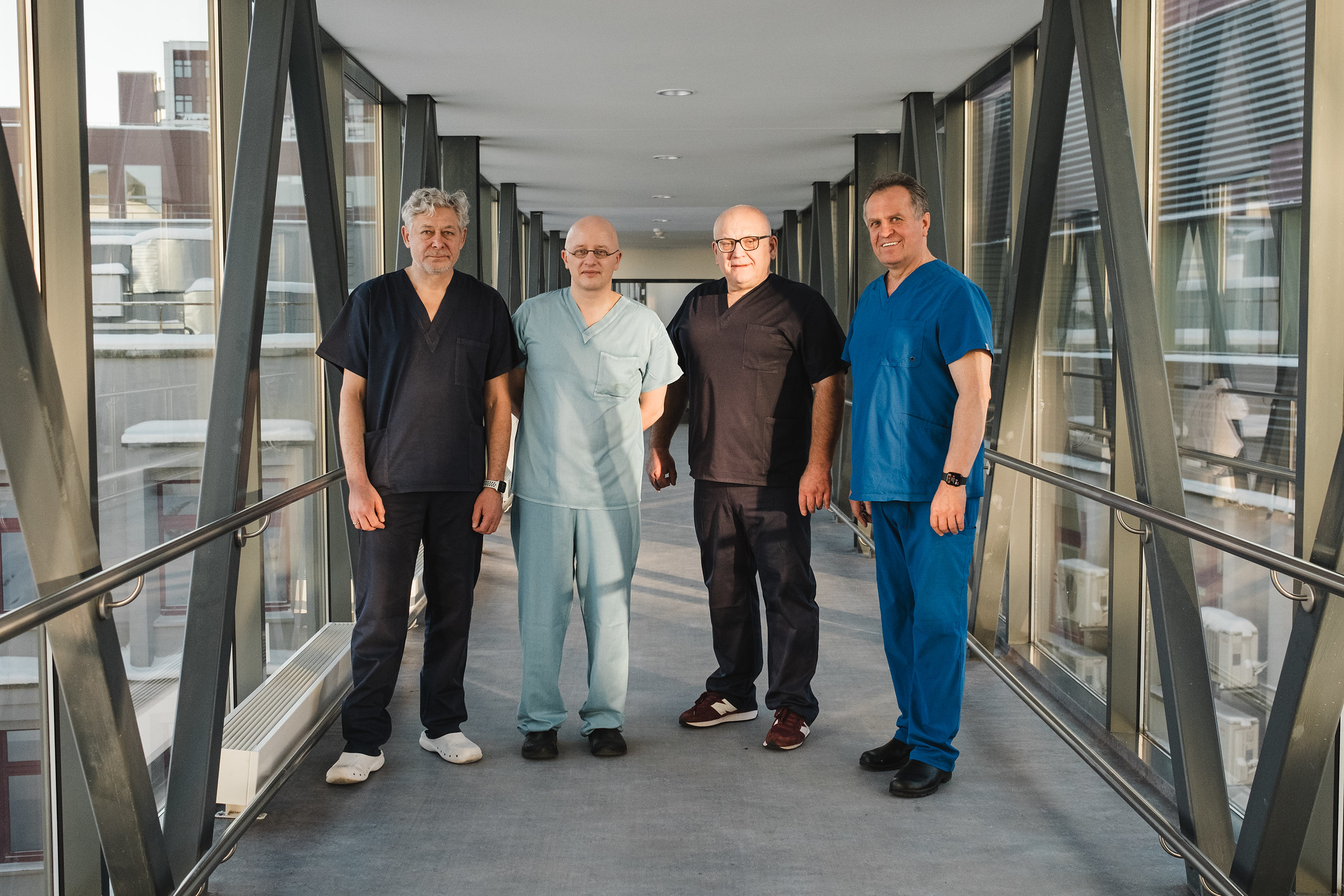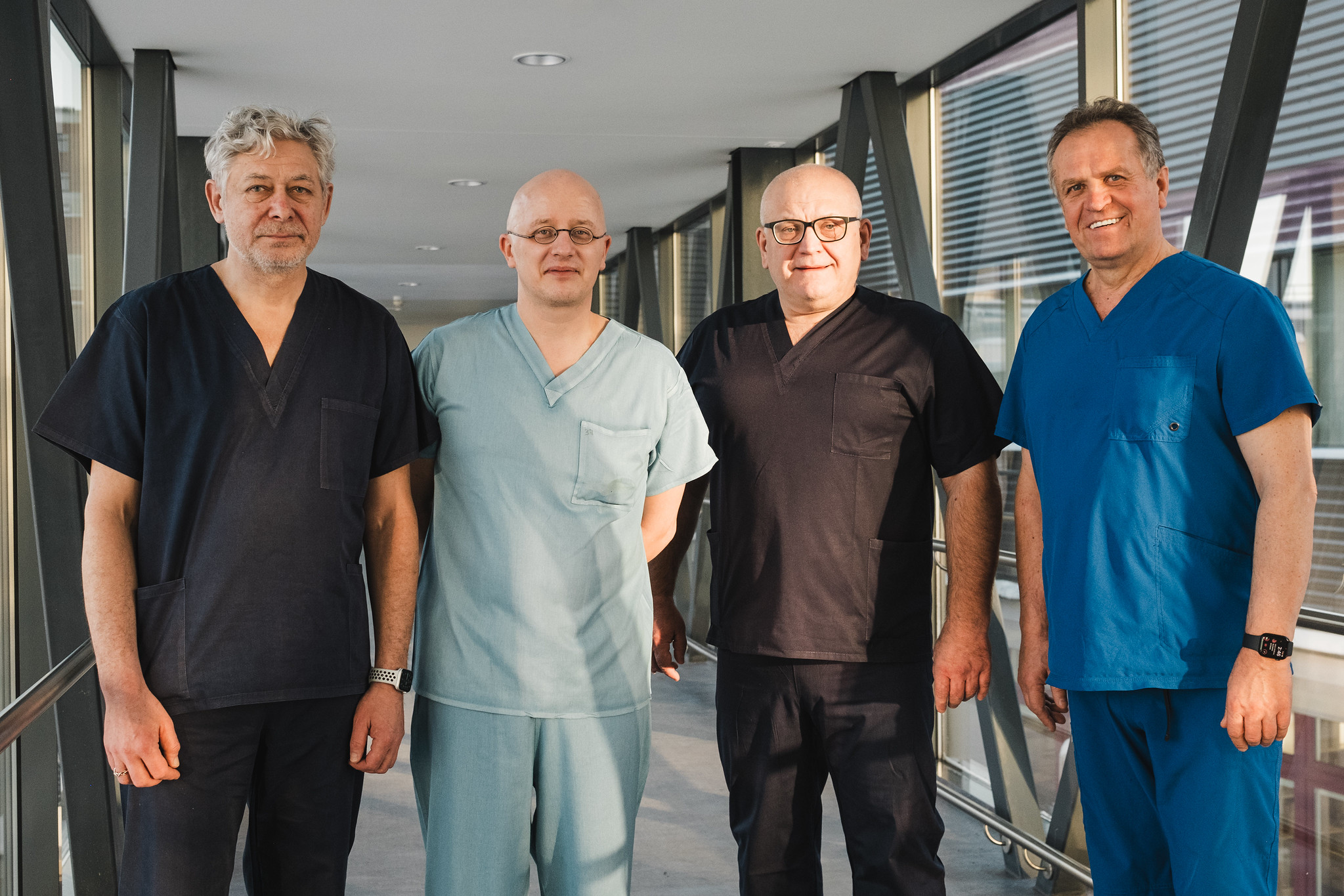Prof. Pranas Šerpytis, Member of the Group of VU Scientists Nominated for the Lithuanian Science Award: In Medicine, Science Goes Hand in Hand With Practice
 From right to left: Prof. Pranas Šerpytis; Prof. Robertas Stasys Samalavičius; Assoc. Prof. Dr. Vilius Janušauskas; Prof. Kęstutis Ručinskas
From right to left: Prof. Pranas Šerpytis; Prof. Robertas Stasys Samalavičius; Assoc. Prof. Dr. Vilius Janušauskas; Prof. Kęstutis Ručinskas
This year, three groups of scientists from the Faculty of Medicine at Vilnius University (VU MF) have been nominated for the Lithuanian Science Award. This article focuses on the series of papers entitled, The Introduction of Mechanical Circulatory Life Support Systems into Clinical Practice and the Improvements in Methodology (2008–2022), that were submitted for the award by Prof. Pranas Šerpytis (Head of the Clinic of Emergency Medicine at VU MF; and a professor at the Clinic of Cardiac and Vascular Diseases at VU MF), Prof. Robertas Stasys Samalavičius (Emergency Medicine Clinic), Prof. Kęstutis Ručinskas (Clinic of Cardiac and Vascular Diseases), and Assoc. Prof. Dr. Vilius Janušauskas (Clinic of Cardiac and Vascular Diseases). The scientists agreed to tell us about the papers.
The summation of years of experience
The submitted series of papers covers a 15-year period (2008–2022). The main theme addressed is acute and chronic heart failure and their treatment. It also provides an overview of the introduction of circulatory support devices for use in clinical practice in Lithuania and worldwide and considers the research that has been carried out at the molecular level, delving into the possible causes of these diseases.
According to Professor Šerpytis, not every patient can be fitted with a circulatory support device. “There are, however, young, able-bodied people who do not have any significant accompanying diseases but who develop heart failure after contracting influenza and myocardial infarction, which can then be complicated by inflammation of the heart muscle (myocarditis). In such cases, we can use circulatory support devices to save lives. At the VU MF Clinic of Cardiac and Vascular Diseases, we have an established tradition of using support devices for treatment and the practice of working in a team. If it were not for the whole team of cardiologists, cardiac anesthesiologists, cardiac surgeons and others, we would not be able to help people. We have a wealth of experience,” Prof. Šerpytis explained.
In the series of papers, the researchers summarised their long-term clinical work experience. Prof. Ručinskas described how in 1999 the first artificial ventricle, or “artificial heart”, was connected to a patient at the Clinic of Cardiac and Vascular Diseases. “Today, this serves as a ‘bridge’ to transplantation. For some patients, the artificial ventricle becomes a temporary measure while they wait for donors, who are not numerous in Lithuania. Artificial ventricles allow a person to survive for another year or two, sometimes five until a suitable donor becomes available. Patients spend their time at home and occasionally visit a hospital for check-ups, and some of them are able to do their regular jobs. These support devices allow people to function fully in society.”
“The whole series covers an extensive range of treatments for patients with acute to chronic heart failure. We have been studying the use of circulatory support in both the acute and chronic phases, with a transition to transplantation. My field is extracorporeal membrane oxygenation. This is an artificial circulation technique that we use primarily in the treatment of a specific acute heart failure known as myocardial infarction that occurs when a patient is in cardiogenic shock. As my colleagues have noted, research in this field was started much earlier by Prof. Vytautas Jonas Sirvydis, Prof. Algimantas Marcinkevičius and Assoc. Prof. Alis Baublis. At one time, we led the way in the Baltic countries, and we provided consultancy. Our clinic was one of the few in Europe to apply this technique to elderly people. It was innovative at the time,” Prof. Samalavičius said.
Teamwork – an opportunity to save lives
According to the researchers, teamwork is crucial in treating patients with heart failure. “Although we work in slightly different fields, we share the same responsibility and goal – to treat heart failure. For example, Prof. Ručinskas and I are cardiac surgeons, and our direct work involves connecting mechanical support devices, monitoring how patients’ immune responses change after connection, and preparing patients for transplantation. Our research analyses what we do, how successful it is, what we might do better, etc. This is an ongoing approach, with a whole team involved in each stage,” Assoc. Prof. Janušauskas explained.

Prof. Šerpytis also recalled the difficult period during the COVID-19 pandemic when extracorporeal membrane oxygenation had to be applied to the most severe patients. “This was the bridge to salvation. The team brought together by Prof. Samalavičius made a huge contribution to saving lives. We had the strongest expertise in the region. Today, the professor is a guest lecturer at many conferences, sharing his experience.”
The researchers also talked about some of the more memorable, complex cases from their clinical practice. “We had to save an elderly patient who had a myocardial infarction and a history of heart problems. The patient was suffering from deepening cardiogenic shock, so we put him on artificial circulatory support. Counterpulsation, the simplest method, was successful on this occasion. We then added more complex measures, and the patient survived for another 11–12 years. There was also a young patient with influenza and inflammation of the heart muscle (myocarditis) that deteriorated into cardiogenic shock and severe heart failure. Medication did not help, so we also used counterpulsation. It did not work, however, so we used extracorporeal mechanical oxygenation, and the patient survived. These are all lives we were able to save,” Prof. Šerpytis described while sharing sensitive examples from his clinical work. Prof. Ručinskas also recalled the story of a young woman, Aistė Štaraitė, who underwent a heart transplant: “Due to dilated cardiomyopathy, she had needed an artificial ventricle. She later underwent a heart transplant. Štaraitė, who has spoken publicly about her story in the press, is now the President of the Heart Failure Patients’ Association. She travels extensively, giving lectures. All our experience consists of such success stories. No two cases are the same, each time you have to make different decisions,” the professor added.
Young scientists should broaden their horizons
“Science goes hand in hand with clinical practice. You have to be motivated, determined, psychologically prepared, armed with scientific intuition, try to do your best, and, of course, stay ethical, always having empathy for your patients. We are also educators and have teachers we respect, and we try to pass on our experience to our colleagues. The more experience a young scientist or a practitioner has, the better. We are pleased to be a part of Vilnius University, which has such a deep tradition, and to be able to contribute to the advancement of science,” said Prof. Šerpytis, sharing his advice for young scientists.
According to Assoc. Prof. Janušauskas, the researcher aims to help find answers. “When faced with a problem, it is not always clear how to solve it, and not all answers can be found in the literature alone. Clinical research stems from a fundamental need – the desire to help patients. My advice to young colleagues is to take care of your patients and look for answers.”
“One of the most important things in life is to have broad horizons. I was fortunate to have internships at various hospitals in the US: the Deborah Heart and Lung Surgery Centre at Browns Mills (New Jersey), the UMass Memorial Medical Center in Worcester (Massachusetts), the Boston Children’s Hospital (Harvard Medical School) and others. I spent a year at the Ospedali Riuniti Hospital in Bergamo, Italy. I also had internships at the University Hospital of Zurich in Switzerland, the University Hospital of Regensburg in Germany and the La Pitie Salpitriere Hospital (Sorbonne University) in Paris, France. My colleagues have also had internships in some of the world’s best clinics,” Prof. Samalavičius noted.
Prof. Šerpytis welcomed the fact that the Clinic of Emergency Medicine and the Clinic of Cardiac and Vascular Diseases are working together on collaborative research projects with the Leipzig Heart Centre in Germany, the Warsaw Cardiology Institute in Poland, the University of Amsterdam in the Netherlands, the Rabin Medical Centre in Petah, and the Hadassah Medical Center in Jerusalem, both in Israel, the University of Arizona in the US and other institutions of scientific excellence.
According to Prof. Samalavičius, there is no panacea anywhere in the world. “Of course, today is a very different time. In our generation, when we received a new book or an article, we used to share it with each other. Access to literature sources is much easier today. But, as I said, broadening one’s horizons is not just about books and reading. It is also about visiting different clinics worldwide, talking to colleagues, seeing how things are done, and adopting and combining best practices. Only then can you develop a broad horizon, a different way of looking at work, and find like-minded people from whom you can get advice in critical situations,” the professor added.